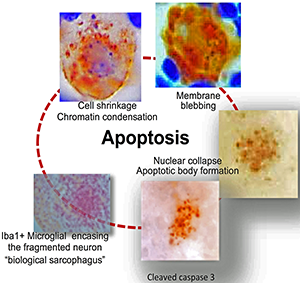In Mice, Antiviral Appears to Block Brain Damage From Latent HSV Reactivation
Research By: Nancy Sawtell, PhD
Post Date: March 5, 2020 | Publish Date: March 5, 2020

Decades after infection, the common herpes simplex virus (HSV) can reactivate, causing affected neurons in the brain to die.
Researchers have suggested that this neuron damage may contribute to Alzheimer’s disease and other neurological conditions.
Now, a study published online March 5, 2020, in the journal PLoS Pathogens reports that the antiviral drug acyclovir prevented HSV reactivation and the death of neurons in mice that were subjected to hyper-thermic stress to mimic fever.
More study is needed to determine if the process is similar in humans.
The study was led by first author Jessica Doll, PhD, and principal investigator Nancy Sawtell, PhD.
| Original title: | Resolution of herpes simplex virus reactivation in vivo results in neuronal destruction |
| Published in: | PLoS Pathogens |
| Publish date: | March 5, 2020 |
Research By







